The curriculum online. History version startup Schoodle
This post will cover my experience and the experience of our team in the production and promotion of service Schoodle.ru.
The theme of the curriculum – it is beaten. By automating their drafting written tens of thousands of theses peacefully resting in the archives of hundreds of universities. Creating a universal tool for scheduling purposes if technically possible, to make this economically successful project, in my view is practically impossible (I agree with the author of the post Program scheduling classes in high school). But to solve the problem of comfortable accommodation schedule online with some extra Goodies (with a focus on end users students) I was considered quite feasible.
I am 33 years old and I live and work in a small town in Ukraine. Ten years of my life I've worked as a Manager of software company specializing in the production of desktop applications in construction. After the dismissal in June 2011, I bravely decided to go to the entrepreneurs and to create your own online project. To consolidate its desire and set of expertise in the field webmastering and SEO — a bit of SEO Studio my friends.
To begin with, that was created in your Evernote note "100 ideas own business" and filled it a couple of weeks. Among other ideas Schoodle (school schedule) stood out the most wide potential audience, the ones niches and potential wow effect.

Actually the idea of the project: any user can enter his or her training schedule and publish it the page, having a mobile version, widget for publication on another website and make your printed poster with the schedule. As Youtube is the publisher of the rollers, and Picassa – gallery, Schoodle – publisher schedules.
Direct analogues can be considered, the projects kakieuroki.ru (orientation for students, there is no mobile version, widget, poster) and stud-net.ru (the orientation of the students have a mobile version, widgets, and posters are not). Know-how Schoodle, is the ability to create multiple schedules for the same study group/class. Service ranks of the entered schedules and determines the most accurate, setting the status to "primary", the rest also remain available. The ranking is based on votes from users and special the rating of trust – the willingness of the author to publish the link in Sots.network, post it on your website, provide your name and e-mail. Turns out that actually anyone can enter your schedule and get it into the phone without fear that the service will come once a bully, and rubbing it.
In fact, the service solves several problems:

Cons idea can be considered seasonality, low traffic monetization of this audience, high risks due to the novelty of this category of services. When a considerable number of benefits, the value of the use is not very high (not the fact that it exceeds the laziness of the introduction of the schedule) – it is obvious that it begs the transition to calendars based on the actual schedules and storage of homework (this is actually in the future).
The service, of course, free to users. In fact it is UGCplatform and the methods of monetization are assumed to be such:
— Placing and selling advertising (within decency of course);
— Selling premium versions of mobile applications (when they do);
— Upon receipt of the mass audience — private platform for the sale of advertising and Lidov (you can target by geography, by educational institutions, classes/courses, or the presence of certain classes in schedule). For example: the tutor will be able to create your page with the lead form and display ads on it for a particular educational institution or class, and pay herewith the completed application.
This list consists of the most priority methods.
In addition, we plan to go to foreign markets (and therefore the name of the English), although in its current form, the value of the project for countries with elective education (where everyone has their own schedule and no training groups) is very small. By the way who knows what countries except the CIS, do not have this system?
The greatest interest of Abrasheva, I am sure, will be just to the design schedules, so the work of this module will stop separately.
Designer schedules of works for schools/universities/colleges/other educational institutions. And mandates the inclusion of training periods, scheduling calls (including complex – for different days of the week), split shifts, account groups and/or classes, the division into even/odd weeks, the division into subgroups, preservation of reference subjects, teachers, classrooms and lessons. All it tried to do in a minimum number of clicks with the best possible understanding of the end user.
Phase I. the Choice of educational institution and the period.
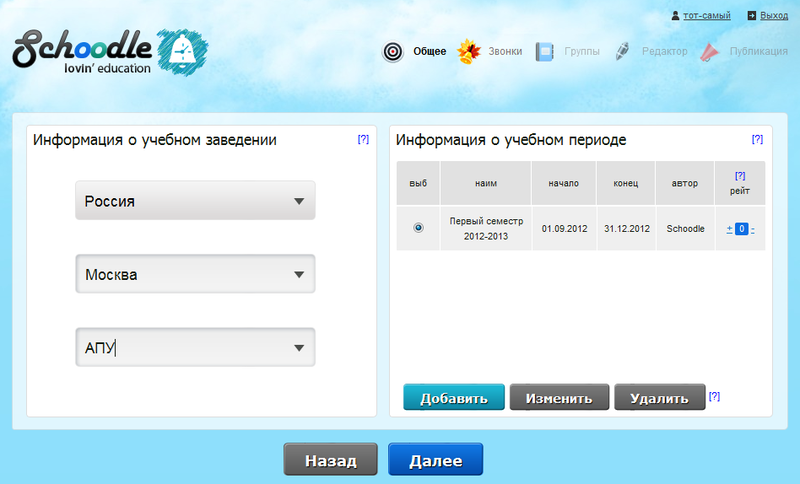
All periods have been created are saved. You can only change those that he created. If the periods for this academic institution was not created automatically is the estimated current period is selected.
Phase II. Select or enter the schedule of calls.

Select the appropriate schedule calls, or create a new one. Haidery conduct an educational program, they are also available on all tabs and tooltips.
Phase III. Select or enter a training group or class
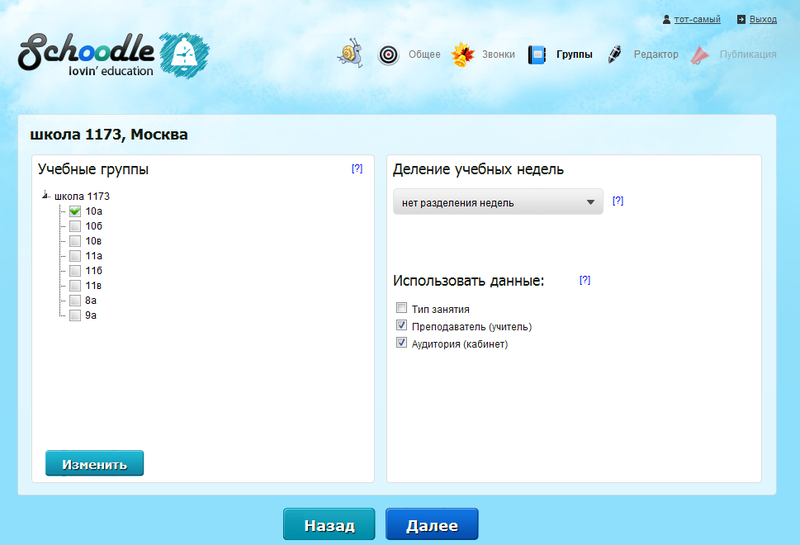
Added to study group (if not previously entered by other users for this school). You can select multiple training groups – then in the next step you can enter schedules for all selected.
Stage IV. Editor schedules
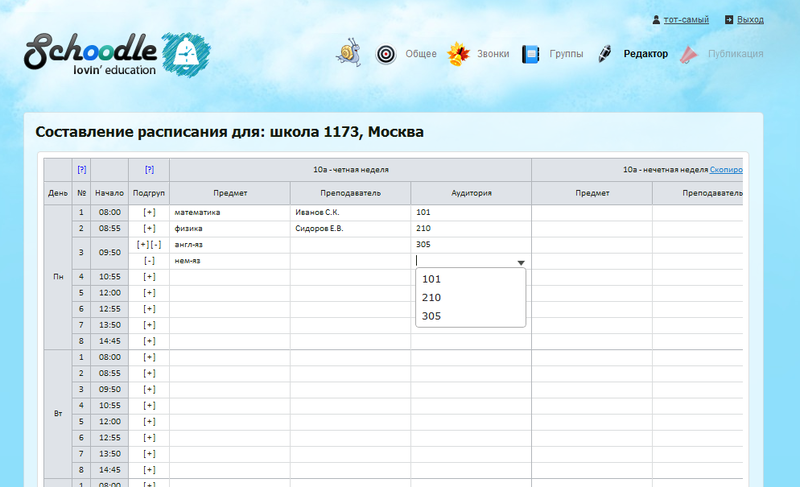
Editor a-La MS Excel is generated on the selected schedule and groups. You can create a division into subgroups. All values entered in cell are remembered – it is enough to enter once and then just select from the list. All values entered will then be offered for the completion of a General directory of educational institutions and the following sponsors of the school or College they will be available. Enter the odd week is in a separate column: we can all copy from is even, and change what is different.
Stage V. Publication schedule

Check before publishing, plus a few options.
Page created schedule looks like this:
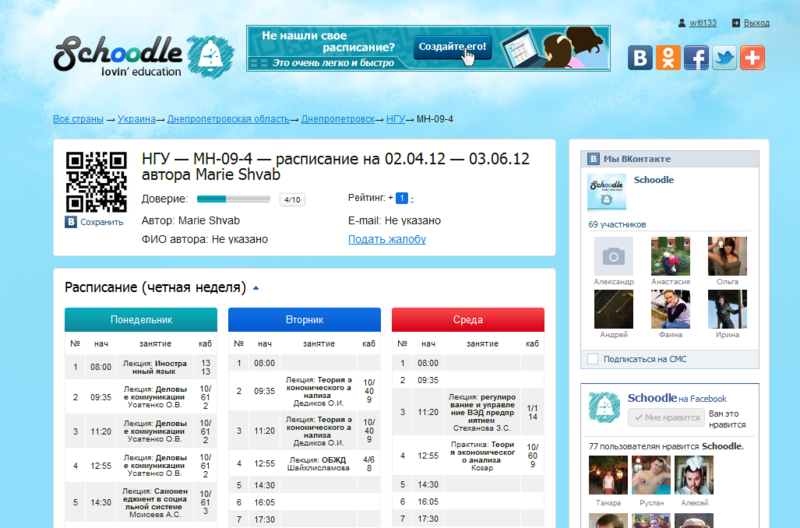
And mobile version:
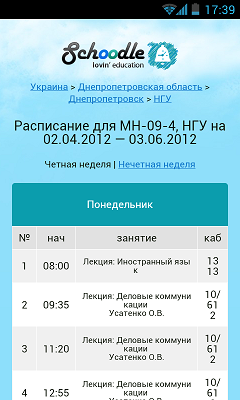
In addition to manual entry of timesheets, from the beginning we planned to make a parser external files with schedules – so you can upload your file MS Word/Excel. But after reviewing a large number of files with examples, it became clear that this task we are seriously slow and in General not the fact that the percentage of successful processing of such files will be above 5-10%. It was decided to make a standard MS Excel template that users can conveniently skopipastit your data file to this, and we're more likely to import it, but ultimately, we just made your editor in MS Excel and supported in it the possibility to insert a group of data:
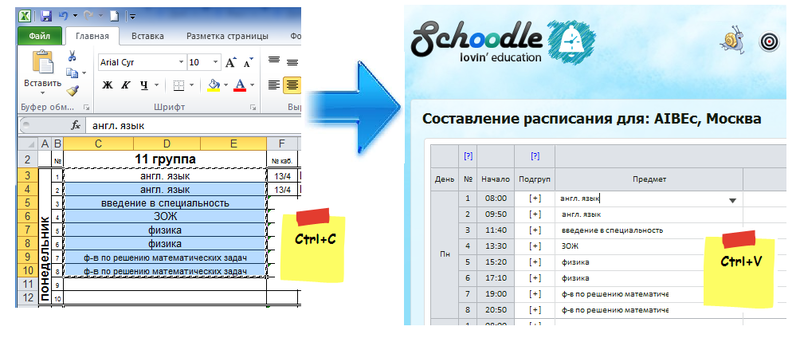
Of course, you can also make the import of the files of programs for scheduling (the Rector, Nika, etc.) – there is usually quite a convenient format such as XML. This task is in the roadmap, but there are no clear priorities from live users.
In practice, if we compare the use of Schoodle with universal calendar (Google Calendar), we get the following advantages and disadvantages:
the
Sep 2011: start designing TK and team building. To the position of CTO of the selected jcrow. Started work on the design. Selected tools and technologies to be used:
the
Nov 2011: finished the development of the skeleton, the team is taken additional a full-time PHP programmer.
December 2012: taken by another programmer PHP/JS to the team full-time. Completed work on the design and layout.
March 2012: released a closed alpha version. Testing and refinement.
APR 10, 2012: the official launch of the public beta.
As always it turns out, the release dates and the estimated budget was exceeded by almost two times. It is clear that at the end of the academic year of interest in the service did not happen. We had to spend a good testing and bugfix (users during this period, 376 the published schedules).
Can't say that he managed to reach the heights in the promotion, the summer period is not significant and more accurate conclusions can be done only in the fall. Of those that tried:
the
What methods will use since September (in addition to):
the
There are also plans for offline activities. This list is not complete and priorities can change significantly.
From mid June the project is on holidays: work on the project only I jcrow — work on SEO, and also done a small features and bugfix. We are shooting a small room (fortunately it is very inexpensive in this city). Plan to involve other members of the team back as soon as it will be visible to the activity and will be funded.
Around the, today we are in the heart of the valley of death – the ability to Finance the project on its own — no, and has not yet begun. It's clear that I went with him to the investors: in all cases received the same response – you need to wait for the fall to see the dynamics in the case of take-off to search for venture capitalists. Interest in the project showed two angel investors, but the case never came. In fact, I can't talk right now about a return on your investment- it is logical that until that moment no one will not give money (he would not give). As the project is a socially useful tool that increases the interest in education, it makes sense to get the grant – to date, our project has two programs to receive grants.
By the way, one famous investor said to me that the theme of education and the schedule in particular – it is a graveyard, which killed a large number of initiatives and startups. It is obvious that at the seed stage under such an idea was unlikely to receive investment because of these statistics...
And yet, we almost always confused with another electronic diary (LMS-sistemoj) is the similarity between Schoodle and electronic diaries, there are actually in terms of the availability of the schedule. Schedule in an electronic diary can be created only by the administration, and it is hidden from casual access, accordingly has all views (and not their goal), Schoodle same schedule can be done by anyone and does not require implementations in schools. And automatiseret electronic diaries, as a rule, only school. Of course, the functionality of only displaying the schedule for us only the beginning, but we don't currently have plans for retraining in an electronic diary. Well, the development plans of the project are:
the
The project has already invested a lot of effort: more than a year of my work, a total of more than 1,900 man-hours of development. We continue to believe in its success, and user reviews tell us that it is needed.
Will be grateful for your criticism, advice and suggestions of cooperation.
Article based on information from habrahabr.ru
The theme of the curriculum – it is beaten. By automating their drafting written tens of thousands of theses peacefully resting in the archives of hundreds of universities. Creating a universal tool for scheduling purposes if technically possible, to make this economically successful project, in my view is practically impossible (I agree with the author of the post Program scheduling classes in high school). But to solve the problem of comfortable accommodation schedule online with some extra Goodies (with a focus on end users students) I was considered quite feasible.
About myself
I am 33 years old and I live and work in a small town in Ukraine. Ten years of my life I've worked as a Manager of software company specializing in the production of desktop applications in construction. After the dismissal in June 2011, I bravely decided to go to the entrepreneurs and to create your own online project. To consolidate its desire and set of expertise in the field webmastering and SEO — a bit of SEO Studio my friends.
the Beginnings of the project
To begin with, that was created in your Evernote note "100 ideas own business" and filled it a couple of weeks. Among other ideas Schoodle (school schedule) stood out the most wide potential audience, the ones niches and potential wow effect.

Actually the idea of the project: any user can enter his or her training schedule and publish it the page, having a mobile version, widget for publication on another website and make your printed poster with the schedule. As Youtube is the publisher of the rollers, and Picassa – gallery, Schoodle – publisher schedules.
Direct analogues can be considered, the projects kakieuroki.ru (orientation for students, there is no mobile version, widget, poster) and stud-net.ru (the orientation of the students have a mobile version, widgets, and posters are not). Know-how Schoodle, is the ability to create multiple schedules for the same study group/class. Service ranks of the entered schedules and determines the most accurate, setting the status to "primary", the rest also remain available. The ranking is based on votes from users and special the rating of trust – the willingness of the author to publish the link in Sots.network, post it on your website, provide your name and e-mail. Turns out that actually anyone can enter your schedule and get it into the phone without fear that the service will come once a bully, and rubbing it.
In fact, the service solves several problems:
-
the
- Access schedule in a convenient way by any user, including using a search engine. the
- Calendar at hand in your phone by scanning the qr code or search m.schoodle.ru. the
- Placement of schedules in a convenient way, on the websites of educational institutions using widgets (in a long time, the files DOC/XLS/PDF with the schedules in the furnace). Widget educational institutions looks like this:
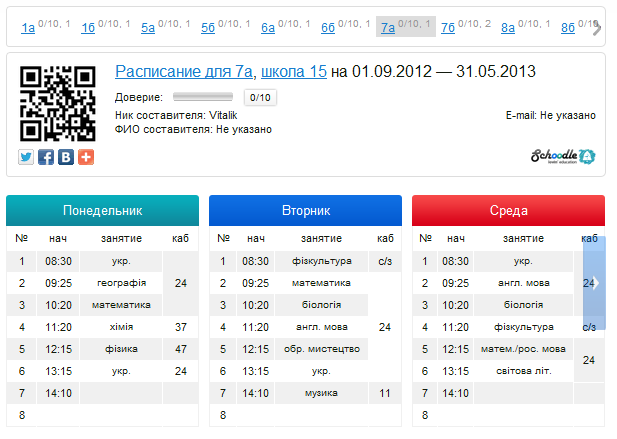 the
the - Quickly generate and print a poster printed with the schedule.
Along the way, turned out the directory of educational institutions, which will be unique data about actual scheduling of calls, popular teachers, and objects, and others which are aggregated with current schedules. Now the catalogue has around 250thousand. educational institutions.

Cons idea can be considered seasonality, low traffic monetization of this audience, high risks due to the novelty of this category of services. When a considerable number of benefits, the value of the use is not very high (not the fact that it exceeds the laziness of the introduction of the schedule) – it is obvious that it begs the transition to calendars based on the actual schedules and storage of homework (this is actually in the future).
Business model
The service, of course, free to users. In fact it is UGCplatform and the methods of monetization are assumed to be such:
— Placing and selling advertising (within decency of course);
— Selling premium versions of mobile applications (when they do);
— Upon receipt of the mass audience — private platform for the sale of advertising and Lidov (you can target by geography, by educational institutions, classes/courses, or the presence of certain classes in schedule). For example: the tutor will be able to create your page with the lead form and display ads on it for a particular educational institution or class, and pay herewith the completed application.
This list consists of the most priority methods.
In addition, we plan to go to foreign markets (and therefore the name of the English), although in its current form, the value of the project for countries with elective education (where everyone has their own schedule and no training groups) is very small. By the way who knows what countries except the CIS, do not have this system?
Principle construction schedules
The greatest interest of Abrasheva, I am sure, will be just to the design schedules, so the work of this module will stop separately.
Designer schedules of works for schools/universities/colleges/other educational institutions. And mandates the inclusion of training periods, scheduling calls (including complex – for different days of the week), split shifts, account groups and/or classes, the division into even/odd weeks, the division into subgroups, preservation of reference subjects, teachers, classrooms and lessons. All it tried to do in a minimum number of clicks with the best possible understanding of the end user.
Phase I. the Choice of educational institution and the period.

All periods have been created are saved. You can only change those that he created. If the periods for this academic institution was not created automatically is the estimated current period is selected.
Phase II. Select or enter the schedule of calls.

Select the appropriate schedule calls, or create a new one. Haidery conduct an educational program, they are also available on all tabs and tooltips.
Phase III. Select or enter a training group or class

Added to study group (if not previously entered by other users for this school). You can select multiple training groups – then in the next step you can enter schedules for all selected.
Stage IV. Editor schedules

Editor a-La MS Excel is generated on the selected schedule and groups. You can create a division into subgroups. All values entered in cell are remembered – it is enough to enter once and then just select from the list. All values entered will then be offered for the completion of a General directory of educational institutions and the following sponsors of the school or College they will be available. Enter the odd week is in a separate column: we can all copy from is even, and change what is different.
Stage V. Publication schedule

Check before publishing, plus a few options.
Page created schedule looks like this:

And mobile version:

In addition to manual entry of timesheets, from the beginning we planned to make a parser external files with schedules – so you can upload your file MS Word/Excel. But after reviewing a large number of files with examples, it became clear that this task we are seriously slow and in General not the fact that the percentage of successful processing of such files will be above 5-10%. It was decided to make a standard MS Excel template that users can conveniently skopipastit your data file to this, and we're more likely to import it, but ultimately, we just made your editor in MS Excel and supported in it the possibility to insert a group of data:

Of course, you can also make the import of the files of programs for scheduling (the Rector, Nika, etc.) – there is usually quite a convenient format such as XML. This task is in the roadmap, but there are no clear priorities from live users.
In practice, if we compare the use of Schoodle with universal calendar (Google Calendar), we get the following advantages and disadvantages:
the
-
the
- Convenient to enter the bell schedule and based on it construct a "blank schedule". And if someone has previously entered a schedule of calls to the educational institutions, and it is actually quite simple to choose.
- + a More convenient and fast to enter all classes on a single screen. It is convenient to consider the division into subgroups and faster to work with even/odd weeks. If there is a file with the schedule you can copy-paste data from there.
- + Storage directories of classes, teachers and classrooms of the institution. Theoretically, if many schedules of the institution has been already introduced, it will be possible to enter your by simply selecting the mouse values from the model.
- + the Mobile version running on phone at any level (with Internet access). Widget on another site, printed posters. the
- — Schoodle is the schedule, not the calendar (yet). Perfect for storage and display of the nominal schedule, not the actual training schedule – consider replacement, exams, etc. in it uncomfortable. For the same reason, to it is not recurring on a weekly/fortnightly schedule-based will not work. the
- — Other features resulting from the added versatility of Google Calendar may not be available on Schoodle.
Timeline of events in the life of the project
Sep 2011: start designing TK and team building. To the position of CTO of the selected jcrow. Started work on the design. Selected tools and technologies to be used:
the
-
the
- Makepy — Mockupbuilder prototyping Axure RP the
- bug tracking – Redmine, vault, SVN the
- programming Language – PHP, framework – your application with MVC, database – MySQL the
- Frontend jQuery UI, jQuery the
- Hosting Amazon AWS
Nov 2011: finished the development of the skeleton, the team is taken additional a full-time PHP programmer.
December 2012: taken by another programmer PHP/JS to the team full-time. Completed work on the design and layout.
March 2012: released a closed alpha version. Testing and refinement.
APR 10, 2012: the official launch of the public beta.
As always it turns out, the release dates and the estimated budget was exceeded by almost two times. It is clear that at the end of the academic year of interest in the service did not happen. We had to spend a good testing and bugfix (users during this period, 376 the published schedules).
Ongoing marketing actions and their results
Can't say that he managed to reach the heights in the promotion, the summer period is not significant and more accurate conclusions can be done only in the fall. Of those that tried:
the
-
the
- Contextual advertising with the use of landing-pages – too low conversion (hopefully not the representative end of academic period). the
- Using copywriters through the stock exchange for writing comments with an appeal to enter the schedule for its educational institutions – the result is approximately the same.
SEO campaign. Promotion on direct keywords and MF queries the directory of educational institutions. Personally, doing this almost all summer. Results just beginning to emerge.
What methods will use since September (in addition to):
the
-
the
- Interaction with thematic groups in the social. media and advertising into them. the
- SMM campaign. Active management of the social. groups the
- traffic Exchange
There are also plans for offline activities. This list is not complete and priorities can change significantly.
Current status and future prospects of the project
From mid June the project is on holidays: work on the project only I jcrow — work on SEO, and also done a small features and bugfix. We are shooting a small room (fortunately it is very inexpensive in this city). Plan to involve other members of the team back as soon as it will be visible to the activity and will be funded.
Around the, today we are in the heart of the valley of death – the ability to Finance the project on its own — no, and has not yet begun. It's clear that I went with him to the investors: in all cases received the same response – you need to wait for the fall to see the dynamics in the case of take-off to search for venture capitalists. Interest in the project showed two angel investors, but the case never came. In fact, I can't talk right now about a return on your investment- it is logical that until that moment no one will not give money (he would not give). As the project is a socially useful tool that increases the interest in education, it makes sense to get the grant – to date, our project has two programs to receive grants.
By the way, one famous investor said to me that the theme of education and the schedule in particular – it is a graveyard, which killed a large number of initiatives and startups. It is obvious that at the seed stage under such an idea was unlikely to receive investment because of these statistics...
And yet, we almost always confused with another electronic diary (LMS-sistemoj) is the similarity between Schoodle and electronic diaries, there are actually in terms of the availability of the schedule. Schedule in an electronic diary can be created only by the administration, and it is hidden from casual access, accordingly has all views (and not their goal), Schoodle same schedule can be done by anyone and does not require implementations in schools. And automatiseret electronic diaries, as a rule, only school. Of course, the functionality of only displaying the schedule for us only the beginning, but we don't currently have plans for retraining in an electronic diary. Well, the development plans of the project are:
the
-
the
- VK App the
- Mobile application Android, iOS, Windows Phone the
- Video with a viral effect the
- to Improve the functionality of the posters the ability to manually move the blocks the
- the Gadget to your desktop Windows Vista/7 the
- App Chrome, FF, Opera the
- Version 2.0: creation of training calendars based on time schedules: the ability to return, exams, homework assignments, lecture notes, etc.
The project has already invested a lot of effort: more than a year of my work, a total of more than 1,900 man-hours of development. We continue to believe in its success, and user reviews tell us that it is needed.
Will be grateful for your criticism, advice and suggestions of cooperation.
Комментарии
Отправить комментарий